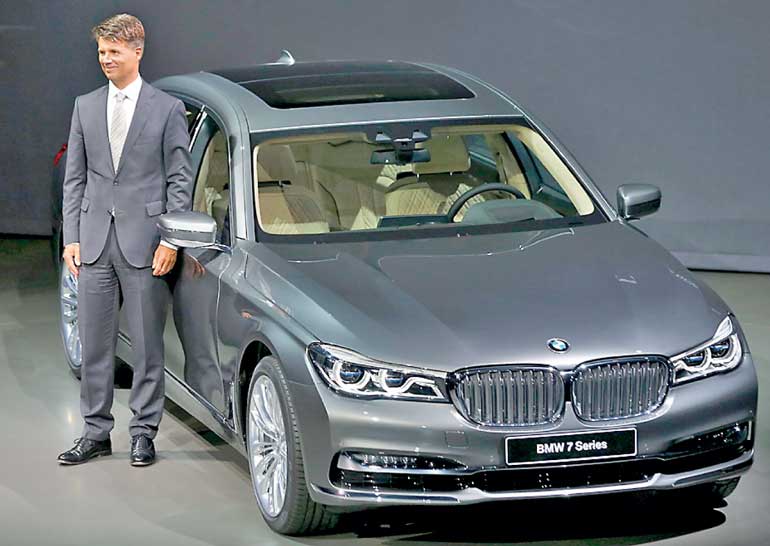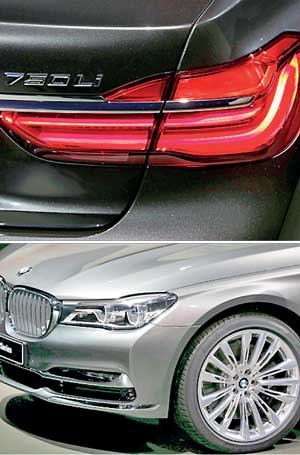Friday Feb 20, 2026
Friday Feb 20, 2026
Friday, 12 June 2015 00:00 - - {{hitsCtrl.values.hits}}

Harald Krueger, Chairman of the Board of Management of BMW, poses during the world premiere of the new BMW 7 series car at the company's headquarters in Munich, Germany - REUTERS
MUNICH (Reuters) : German luxury carmaker BMW unveiled its new flagship sedan, the 7-series, touting the car’s digital prowess more than the number of cylinders and repositioning the sportscar brand for an era of low emissions.
The sixth generation of the limousine features wireless inductive charging of mobile phones, touchscreen  displays and a removable 7 inch tablet computer to control infotainment functions. Despite heavy electronics, the car is also lighter than its predecessor, making it more fuel efficient.
displays and a removable 7 inch tablet computer to control infotainment functions. Despite heavy electronics, the car is also lighter than its predecessor, making it more fuel efficient.
“With each generation of the 7 series we have brought our customers’ needs to the road, adapting accordingly as time moved on,” said Harald Krueger, who took the helm at BMW as chief executive last month.
“We are responding to the digitalisation of modern mobility,” Krueger said at the presentation in Munich on Wednesday.
BMW sold 48,480 7-series in 2014, less than half the 101,428 S-Class limousines sold by rival Mercedes-Benz but more than the 37,158 Audi A8 limousines sold that year, analysts at IHS automotive said.
IHS analyst Tim Urquhart said, “there is a big chance for BMW to close the gap in performance, comfort and reputational terms for its flagship sedan, as its fair to say the last car was slightly uninspired.”
The new car has software and sensors that help move it out of a parking space or garage all by itself, and can adjust automatically to speed limits.
A range of six and eight cylinder engines will be available when the car hits showrooms in October.
BMW has made use of carbon fibre materials as a way to steal the march on the Mercedes-Benz S-Class. As a result, the car is 130 kilograms lighter than the previous model.
Saving 100 kilograms (220 lb) in vehicle weight can cut fuel consumption by 0.6 litres per 100 kilometres, helping BMW meet stringent anti-emissions rules, consultants at Frost & Sullivan said.
BMW invested between 1.5 billion euros ($1.7 billion) and 2 billion to develop carbon-fibre electric and hybrid cars, according to analysts’ estimates.
“BMW is trying to find a competitive advantage. Carbon fibre and the car’s digital technologies are part of this strategy Franz-Rudolf Esch, professor of automotive marketing at the European Business School said.

The Bavarian carmaker has pitched the limousine as a frugal mover. The 750i xdrive model consumes 8.1 litres of fuel per 100 kilometres, or 189 grams of CO2 emissions per kilometre.
The plug-in hybrid model boasts fuel consumption of 2.1 litres per kilometre and just 49 grams of CO2 per kilometre, the company said.
Mercedes launched its sixth-generation S-Class limousine two years ago costing upwards of 72,000 euros, weighing 100 kilos less than the previous model and featuring fully reclining seats, lane detecting cameras and flat screen displays.